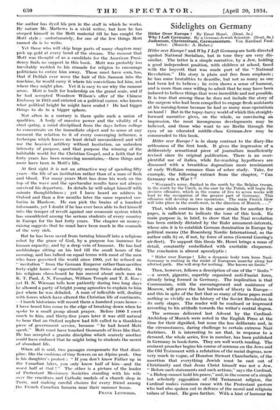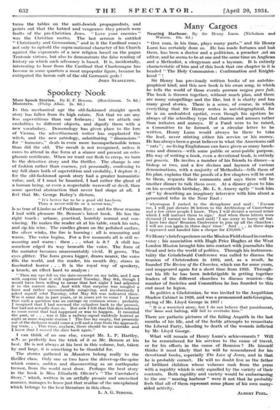Sidelights on Germany
Hitler Over Europe ? By Ernst Henri. (Dent, 5a.) Hitler over Europe? and. Why I Left Germany are both directed against National Socialism, but in tone they are very dis-
similar. The latter is a simple narrative, by a Jew, holding a good independent position, with children at school, faced
w;th the boycott that was made part of the " National Revolution." His story is plain and free from emphasis; he has some brutalities to describe, but not so many as one had been led to believe ; he even "shows a sense of humoui, and is more than once willing to admit that he may have been induced to believe things that were incredible and not possible. It is true that among these he does not include the story of the surgeon who had been compelled to engage fresh assistants at his nursing-home because he had so many nose-operations on hand ! But in the topsy-turvy world of which this straight- forward narrative gives, on the whole, so convincing an impression, the most incongruous developments may be believed, and those who want to see Berlin through the eyes of an educated middle-class German-Jew may be commended to this book.
Hitler over Europe ? is in sharp contrast to the diary-like artlessness of the first book. It gives the impression of a deliberately sensational piece of journalism insufficiently revised since its original publication. There is an over- plentiful use of italics, while far-reaching hypotheses are discussed with a breathless dogmatism more reminiscent of early Wellsian romance than of sober study. Take, for example, the following extract from the chapter, " Can Germany win a War? "
" Weygand's army, flanked in the north by the Belgian troops, in the south by the Czech, in the east by the Polish, wilt begin the decisive offensive, which in the course of five to seven weeks will lead to the occupation of the greater part of Germany. This offensive will develop in two operations. The main French blow will take place in the south-west, in the direction of Munich. . .."
That, which continues in the same strain for another few pages, is sufficient to indicate the tone of this book. Its main purpose is, in brief, to show that the Nazi revolution has been entirely dictated by the' Ruhr armament-interests, whose aim it is to establish German domination in Europe by political means (the Rosenberg Nordic International, as the author calls it) or, if not, by force of arms (General Goering's air-fleet). To support this thesis Mr. Henri brings a mass of detail, constantly embellished with excitable eloquence. The conclusion is almost apocalyptic : " Hitler over Europe ! Like a dynamic body torn loose Nazi- Germany is rushing in the midst of European anarchy along her allotted path. She will stop for nothing. She knows no limits."
Then, however, follows a description of one of the " limits —a secret, gigantic, superbly organized anti-Fascist force, already being formed in Germany. The implication is that
Communism, with the encouragement and assistance of Moscow, will prove the last bulwark of liberty in Europe— and this in spite of the fact that so many of these pages recall nothing so vividly as the history of the Soviet Revolution in its early stages. The reader will be confused or impressed according to his attitude towards the writer's central dogma.
The sermons delivered last Advent by the Cardinal- Archishop of Munich were noted in the English Press at the
time for their dignified, but none the less deliberate and, in the circumstances, daring challenge to certain extreme Nail
doctrines. It is interesting to see that, in response to a demand, the whole series, five in number, has been published in Germany in book-form. They are well worth reading. The eminent preacher begins his course of sermons on the Jews and the Old Testament with a refutation of the racial dogmas, now very much in vogue, of Houston Stewart Chamberlain, of the assertion that everything Jewish must be cast out bf Christianity and that Jesus Christ himself was not a Jew.
" Before such statements and such actions," says the Cardinal, "a Bishop cannot hold his peace," and, in the course of a simple
but scholarly ;e4iosition Old Testament religion, the Cardinal makes common cause with the Protestant pastors who had also spoken out in defence of the moral and religions values of Israel. He-goes further. With a hint of humour-he
turns the tables on the anti-Jewish propagandists, and points out that the hatred and vengeance they preach were faults of the pre-Christian Jews. " Love your enemies " was the Christian motto. The last sermon is entitled " Christianity and Germanism," and in it the Cardinal essays not only to uphold the supra-national character of his Church against the exponents of a new religion based on the pagan Teutonic virtues, but also to demonstrate the false reading of history on which such advocacy is based. It is, incidentally, interesting to hear from the Cardinal that Charlemagne has become in some quarters a most unpopular figure, because he extirpated the heroic cult of the old Germanic gods !
JOHN STAPLETON.













































 Previous page
Previous page